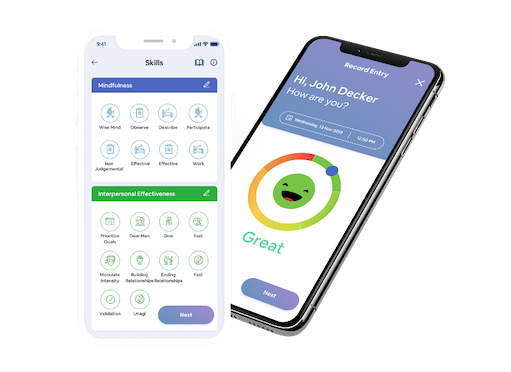Crises are a part of life, whether big or small - they are capable of overwhelming people and compelling them to react with negative behaviors. Specific traditional treatment approaches focus on avoiding painful emotions but distress tolerance skills in DBT teach patients that pain is inevitable. The best way to overcome it is by accepting your emotions and ensuring a more manageable emotional level for crisis survival.
When DBT was developed, there were no existing treatment manuals that addressed temporary toleration of distressing events or circumstances. Available behavioral treatment focused on changing behavior, while distress tolerance taught patients to accept, find meaning, and experience emotional distress. As distress tolerance skills came into existence, it was applied to train patients numerous "delay of gratification" and self-soothing techniques aimed at surviving crises while preventing them from indulging in dysfunctional behaviors (e.g., using drugs, attempting suicide, or engaging in other destructive behavior). In distress, tolerance is a set of skills focused on reality acknowledgment, which aims to reduce pain and increase freedom when distressing facts cannot be changed immediately.
Radical Acceptance For improving Distress Tolerance Skills
An essential tool of distress tolerance is Radical Acceptance. Radical Acceptance is not a painkiller. It is the very embodiment of the DBT Approach through which you remain aware of your present situation and acknowledge it without evaluation or judgment. Radical Acceptance testifies the fact that painful emotions can neither be suppressed nor avoided. They will continue to exist, but it's our skillful stance that creates the impact. As you radically accept your emotions, you are ultimately making a choice - a choice of Acceptance.
Imagine having a cavity problem, and you need to see a dentist. The cavity problem needs immediate attention but you are terrified of the treatment involved in curing it, so you choose to stay in denial. However, you can't bear the pain anymore and you finally decide to consult a dentist. You soon realize that he is not very warm with his patients, and in a constant hurry to strike that spinning drill. So, you escape from the clinic and start neglecting your pain. But things become more complicated, and cutting off certain foods becomes the only option.
In this case, Radical Acceptance of the situation can be your ultimate stairway to peace. If you acknowledge the fact that you need a dentist or things might go to the extent of getting a root canal done which is even more painful, it won't seem that hard.
And let's not forget that when you are all geared up in that dentist chair, with a bright bulb hanging over your head, you are terrified, but you can use this circumstance to improvise yourself.
While practicing Radical Acceptance, a person becomes less vulnerable to emotions and adopts a non-judgmental attitude towards themselves, thereby, not succumbing to negative urges.
Here is a list of four skills essential for adopting the Distress Tolerance module in DBT:
- Distracting
- Self Soothing
- Improving the Moment
- Analyzing Pros and Cons
4-Skill Guide For Navigating Emotional Distress
Distracting
The first skill - Distracting is composed of the acronym ACCEPTS, which allows you to shift your focus from negative thoughts to a more neutral or soothing emotion. ACCEPTS stands for Activities, Contributing, Comparisons, Emotions, Push away, Thoughts, and Sensation.
1. Activities
Engage in exciting events which are healthy - read a book, make some mango jam, go for a walk, or call your distant friend. Anything that keeps negative emotions at bay is ascribed to be helpful.
2. Contributing
An act of service that is considered generous or helpful to others can make you a better person and soothe your intense emotions piled up within you.
3. Comparison
Compare yourself with people who are less fortunate and be grateful for all the things you possess in life.
4. Emotions
Whenever negative emotions strike you, instead of acting on it, perform opposite activities like dancing on your favorite beat or singing your heart out.
5. Push away
Get rid of your current situation mentally, and start focusing on something pleasant, totally unrelated to your present location.
6. Thoughts
Divert your thoughts from your present emotions and engage in neural activities like solving puzzles or playing chess.
7. Stimulate
Restore physical sensations that can help you deviate from your current state of mind - drink some hot chocolate, enjoy some DIY pedicure, or hold some ice cubes.

Self-Soothing
Another simple way to apply distress tolerance in a crisis is to use your body's senses. Self-soothing through bodily senses can quickly decrease the intensity of painful emotions. Here are the five senses to nurture for improving your distress tolerance skills:
1. Vision
Look at eye-catching objects such as flowers, art, and delicious food or watch artistic videos to soothe your mind.
2. Hearing
Listening to soft or lively music or enjoying the sea's calming waves can work wonders to ease your distressed mind.
3. Smell
It is said the scent of lavender works magically in alleviating painful emotions. Smelling your favorite perfume or lotion or baking an aromatic cake is a great way to heal your present emotional state.
4. Taste
Enjoy a hearty meal or taste a decadent dessert. Experiment with new flavors, and focus on them during the entire course.
5. Touch
Stimulating sensations of contact is an effective way to reduce stress or anxiety. Snuggle up in your soft blanket or hug your pet for a soothing feeling.
Improving the moment
Whether it's a small problem (you broke your lipstick) or a more significant one (you broke your foot), you do not have control over unpleasant situations. And the positive attribute of problems is that they don't last forever. However, until the moment they do, you will need distress tolerance skills to endure such events without engaging in unhealthy behaviors.
The dialectical behavior skill IMPROVE is a useful technique to tolerate emotions until the intensity subsides.
IMPROVE stands for Imagery, Meaning, Prayer, Relaxation, One thing in the moment, Vacation, and Encouragement.
1. Imagery
Imagine yourself handling the situation effectively while being in your wise mind. As you assume your smart action, you will be able to overcome the job likewise.
2. Meaning
Try to find meaning in painful situations. For example, contemplate what you can learn from it. In this way, you can be empathetic towards yourself and even work out flawed relationships.
3. Prayer
Prayer can come in any form. As you believe in some superpower and surrender yourself to it, you automatically yield the attribute of tolerating situations longer.
4. Relaxation
Relaxation can be performed through meditation, diaphragmatic breathing, and exercises to lower stress.
5. Focus
The process of focusing on the present, as you let go of the past and future, helps you improve distress tolerance skills.
6. Vacation
Vacation means taking a mental break from challenging circumstances by engaging in some pleasant activities. This could be taking a weekend trip, or ignoring calls and emails for a few hours.
7. Encouragement
Encouragement doesn't have to come from external factors. You can encourage yourself by telling impactful things to yourself - "I can do it", "This looks easy to me", "I got this," and so on.
Analyzing Pros And Cons
Making sensible emotions right after a distressing event is difficult, especially if you are not in your wise mind.
For example, you have a terrible fight with your partner, and this event conjures up your mind with guilt and shame. Your emotions become uncontrollable and your vulnerability increases. You begin developing harmful urges to overeat or self-harm or exercise immensely without rest. These thoughts are common but tiresome to deal with. According to Dialectical Behavior Therapy, the pros and cons list can help you weigh out the consequences of such situations. For example, asking yourself which behavior is the best for you? This skill can be useful for combating impulsive urges and their destructive outcomes.
Conclusion
Distress tolerance skills are valuable tools that you can learn through Dialectical Behavior Therapy to help yourself in preserving balance in the face of crises, accepting the distress, and coping with it in healthier ways. As you practice the skills of distraction, self-soothing, improving the moment, and focusing on pros and cons, you automatically attain the power to weather stressful circumstances and decrease painful feelings and dysfunctional urges.

With the advancement of Technology, everything can be availed via a few taps of your phone screen. To make Dialectical Behavioral Therapy Services more accessible, the team here at Swasth has built the DBT Coach (an app for DBT). Learn, Practice, and track your DBT skills via the comprehensive application and engage effectively with your therapist.
Want to connect with your therapist easily? Swasth can assist you!
Need more information, stay tuned here, or follow us at Facebook, and Linkedin.
And yes, don’t forget to share it on your channel too!




